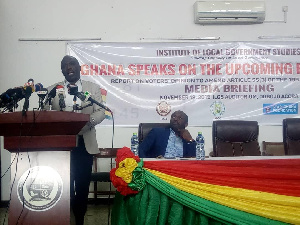- Home - News
- Polls
- Year In Review
- News Archive
- Crime & Punishment
- Politics
- Regional
- Editorial
- Health
- Ghanaians Abroad
- Tabloid
- Africa
- Religion
- Election 2020
- Coronavirus
- Photo Archives
- News Headlines
- Press Release
General News of Wednesday, 20 November 2019
Source: thechronicle.com.gh
Intensify education on referendum - ILGS
An opinion poll by the Institute of Local Government Studies (ILGS) on the upcoming referendum has revealed that awareness creation must be intensified in three regions – Eastern, Ashanti and Western North.
The opinion poll, which covered all the 16 regions of the country, revealed that while total awareness of the nation is 66 per cent (%), the authorities needed to intensive awareness campaigns, as voters in these regions have the lowest knowledge about the essence of the referendum. Meanwhile, awareness in other regions like Central, Savannah, Upper East, West, Ahafo and Northern is high.
Similarly, regions that require an intensive campaign to boost voter participation include Greater Accra (50%), Western North (53%) and Eastern (54%). These regions constitute about 30% of the registered voters hence can have a significant effect on the referendum.
Dr Nicholas Awortwi, Director of the ILGS, briefing the media of the outcome of the poll yesterday in Accra, said out of 6494 voter respondents, 4,358 (67%) said they would turn out to vote in the coming referendum, 1,139 (18%) said they would not turn out, 997 (15%) are yet to decide.
Just like the recent Afrobarometer findings, he said the ILGS survey result shows that more men, representing 72%, said they will turn out to vote in the referendum, as compared to 60% of female voters although a higher percentage of females would vote yes as against males.
Interestingly, awareness among the youth is lower as against the adult population. The survey shows that both demography would vote yes in support of politicisation of local elections.
He said, while 67% of registered voters are aware of the referendum, two out five students (59%) are not. The awareness is higher with employed people (70%) than those without jobs (57%).
Furthermore, voters in National Democratic Congress (NDC), 72%, and New Patriotic Party (NPP), 66%, strongholds are likely to come out in their numbers to vote yes to enable political parties participate in local elections.
Analysing the findings, Dr Awortwi further said that voter awareness of the referendum was 66%, four weeks to the polling day, was commendable, given that the media campaign started late.
“The campaign should focus on explaining the essence of the referendum that is about amendment of Article 55(3) of the Constitution that forbids political parties to participate in LG elections, as only 54% could explain that in the survey.
“The challenge to campaigners is how to explain the essence of the referendum without linking it to the election of MMDCEs, because, to the voter, the two are inter-related. The question of why the constitutional amendment to article 55(3) is being proposed cannot be answered succinctly without reference to election of MMDCEs and Assemblymen and women on political party system,” he added.
According to Dr Awortwi, it was not surprising that 43% of the respondents misconstrued the referendum to mean election of MMDCEs, Assembly and Unit Committee Members. He said, given that the youth constitute a large proportion of voters, efforts should be made towards improving their awareness on the referendum. Campaign messages, using the social media, will be important.
Furthermore, almost half of the people without education have no information on the referendum. While this is to be expected, it is important that the referendum does not become the preserve of the elites. Awareness creation, using drama, skits, songs and other local languages, will be needed to enable non-educated people to understand.
Since the NDC and some members of the National House of Chiefs had urged the public to vote NO in the referendum, the ILGS will conduct a follow-up opinion poll to find out whether these decisions had changed.
Entertainment










